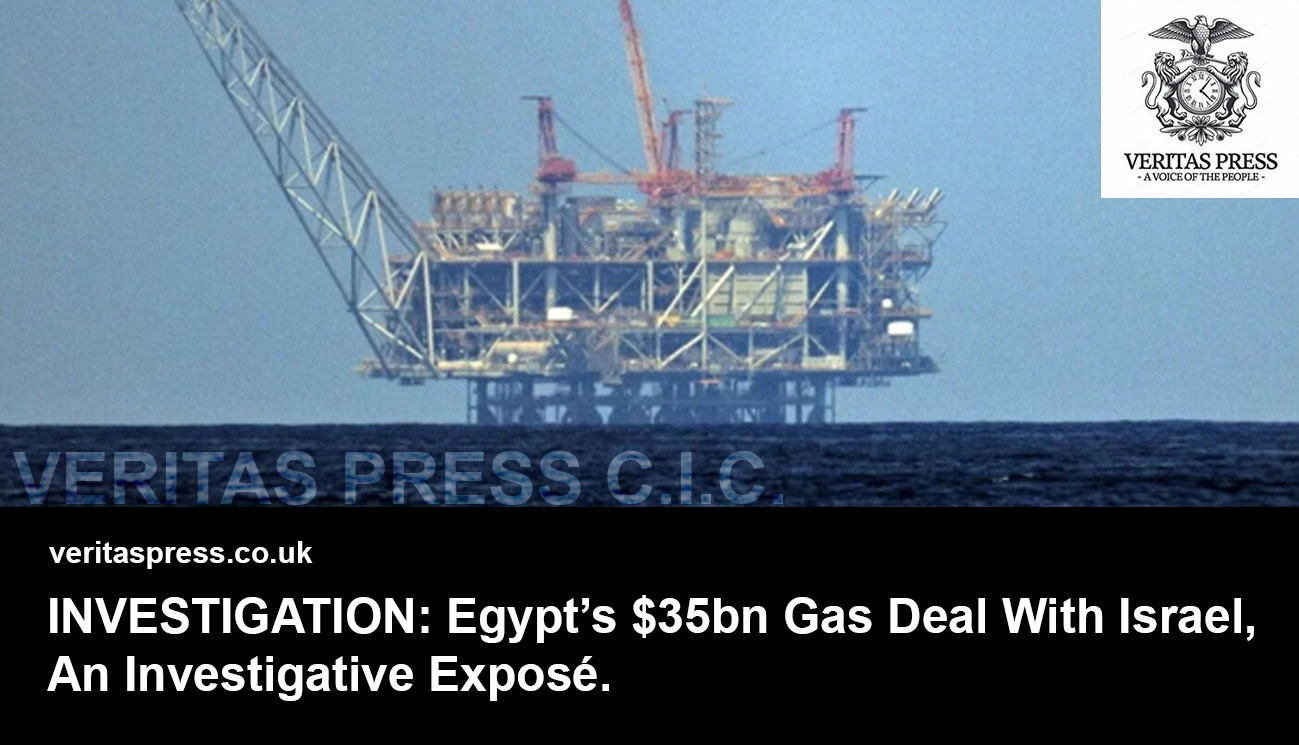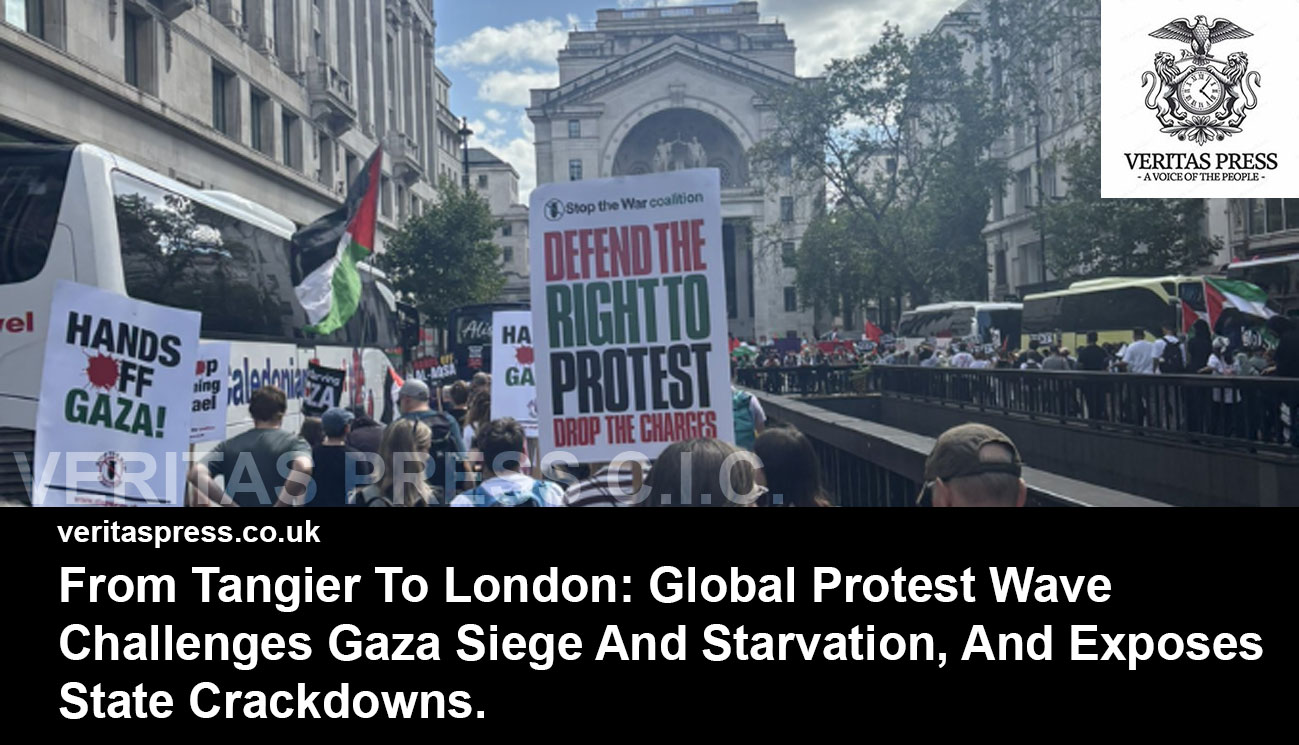Press Release: Veritas Press C.I.C.
Author: Kamran Faqir
Article Date Published: 09 Aug 2025 at 10:58 GMT
Category: Middle East | Egypt-Israel | Energy War
Source(s): Veritas Press C.I.C. | Multi News Agencies
On 7 August 2025, NewMed Energy — a lead partner in Israel’s Leviathan gas field-announced what it called a “landmark” $35 billion export agreement to supply 130 billion cubic metres (bcm) of natural gas to Egypt through 2040, the largest export deal in Israel’s history. The headline sells is simple: cheaper pipeline gas for a country that has slipped from exporter to importer. But beneath the glossy numbers lies a fraught mix of geopolitics, creeping dependency, contested maritime claims, opaque contracting and an incendiary public politics in Egypt and across the region.
This is a story about energy security and energy power, about who profits when maritime boundaries are ignored, who pays when supply chains are politicised, and how infrastructure and influence can outlast ceasefires and court rulings.
What The Contract Really Promises, And What It Hides:
NewMed’s statement sets deliveries in two stages: 20 bcm from early 2026, once immediate pipeline connections are upgraded, and 110 bcm following further expansion and a new onshore pipeline via Nitzana, projects that are not yet complete. Critically, the company warned there is “no assurance” that those conditions will be met. That non-guarantee is not a footnote: it pins Egypt’s energy future to a serially fragile construction and security timetable.
Egypt’s political economy also shifts beneath the surface. Independent analysis by the Egyptian outlet Mada Masr indicates the new contract results in approximately a 14–14.8% increase in price per bcm compared to the previous agreement, a significant premium when applied over decades and hundreds of bcm. The state will therefore sacrifice some unit-price predictability in favour of a broader, structural reliance on Israeli pipeline flows. Mada Masr
NewMed and Israeli officials sell the deal as pragmatic: pipeline gas avoids costly liquefaction and regasification, they argue, and will save Egypt money compared with LNG. Yossi Abu, NewMed’s CEO, described the agreement as a “win-win” that would materially lower Egypt’s import bill. Yet that calculus presumes uninterrupted flows and political normalcy, things that have repeatedly been fractured since October 2023.
A Geopolitics Of Exclusion: Gaza Marine, Contested Waters And Legal Risk:
The Leviathan fields sit in the Levant basin, the same resource geography that includes the long-stalled Gaza Marine field. British Gas discovered Gaza Marine in 1999 and estimated reserves that could underpin Palestinian energy sovereignty; those reserves remain undeveloped, repeatedly blocked by Israeli security objections and political manoeuvres. Independent legal and campaigning bodies warn that the commercialisation of Eastern Mediterranean gas is happening on terms that exclude Palestinian claims and revenues.
Campaigners from Global Witness have gone further: they argue that recent regional energy deals, and the EU’s engagement with gas transited via pipelines tied to Israel and Egypt, risk breaching international law because parts of that gas transit through Palestinian maritime zones without consent or compensation. That is not academic: it implies governments and companies may be complicit in entrenching extraction arrangements that dispossess Palestinians of rightful resource value.
From Infrastructure To Occupation: Why The Deal Fuels Political Outrage.
Egypt’s domestic politics make this deal inflammable. The country suffered rolling blackouts during recent summers, and energy shortages are a visible source of public anger. Many Egyptians see the $35bn contract as not just an economic bargain but a political sellout: paying more to a state widely accused of a blockade on Gaza, while Palestinians are denied the development of their own offshore assets, generates a potency of grievance that state messaging struggles to drown out. Mada Masr, local activists and online campaigns framed the agreement as evidence of Cairo’s “economic complicity” in the siege of Gaza.
Rights groups and some Egyptian activists link energy ties to repression of dissent: organisers who attempted to mobilise around the Rafah crossing last year or to pressure Cairo to open supply routes for aid faced detention, deportation and surveillance. That punitive approach to dissent, activists say, deepens the sense that energy diplomacy and security priorities are being used to discipline domestic politics.
The Nord Stream Question: Sabotage, Market Re-Ordering And Contested Narratives.
The energy story does not end in the Eastern Mediterranean. The September 2022 Nord Stream pipeline sabotage, which ruptured Russia-to-Germany gas lines, materially altered European gas flows and intensified competition for replacement volumes. Investigations remain contested and unresolved; public probes in Scandinavia and Germany identified sabotage without publicly attributing responsibility, while reporting and intelligence assessments have floated competing theories about actors ranging from pro-Ukrainian groups to state actors. Independent OSINT researchers and investigative outlets have documented opaque operations and conflicting intelligence threads.
Some analysts and activists draw a strategic through-line: they see the sudden removal of a major Russian supply route as having opened a privileged space for Eastern Mediterranean producers, primarily Israel, to scale exports to Europe and its partner markets, and for regional supply corridors (via Egypt) to gain geopolitical weight. Proponents of this view argue that the sequence of events, the Baltic sabotage, the acceleration of EastMed deals, and the sidelining of Gaza Marine should be read together as part of an emergent energy architecture that benefits Israeli export ambitions while leaving Palestinian claims unremedied. These are contested, political arguments, credible to some analysts and activists, disputed or denied by others, but they matter because energy wars are fought through pipelines, permits and contracts as much as through tanks and trenches.
Who Benefits And Who Carries The Risk?
- Profits: Israeli partners and shareholders in Leviathan will see large, long-dated revenue streams and a stronger hand in regional energy politics. Chevron and domestic partners stand to lock in royalties and export rents.
- Egyptian balance sheet: Cairo reduces its immediate LNG bill volatility but raises long-term political exposure and possible contingent liabilities if infrastructure or security fails. Independent Egyptian reporting suggests the public ultimately pays the price via higher imports and tighter fiscal margins.
- Palestinian exclusion: Gaza Marine remains undeveloped; Palestinian claims over adjacent maritime zones are sidelined by new export routes and commercial normalisation. Global civil-society groups warn this is an extractive settlement that perpetuates dispossession.
Voices And Sourcing:
- Yossi Abu, NewMed CEO: called the deal “strategically important” and a “win-win” that materially reduces Egypt’s gas import costs.
- Mada Masr (investigation): calculated a ~14.8% per-bcm price increase and flagged opaque buyer arrangements tied to Dolphinus/Blue Ocean and state-linked resellers.
- Global Witness: warned that EU and regional deals risk breaching international law by legitimising gas transit that crosses Palestinian maritime zones without consent.
- Independent OSINT and investigative outlets: have documented the unresolved, politicised investigations into Nord Stream sabotage, a key event that reshaped Europe’s gas calculus. The official record remains contested.
What Journalists, MPs And Campaigners Should Demand Next:
- Full contract disclosure: redacted copies of the commercial terms (take-or-pay clauses, arbitration seats, force majeure language) and a public audit of contingent liabilities for the Egyptian state.
- Technical transparency: independent verification of pipeline timetables, environmental permits and security risk assessments for the Ashdod–Ashkelon and Nitzana lines.
- Legal review: formal consideration by international legal bodies of whether existing and proposed pipelines and contracts infringe Palestinian maritime rights under UNCLOS and occupation law.
- Parliamentary oversight: Egyptian MPs and EU lawmakers should summon officials and company executives to explain the national interest rationale and the human-rights implications.
I. Egyptian Parliament – Suggested Questions:
1. On Sovereignty And Palestinian Rights:
To the Minister of Petroleum and Mineral Resources:
Under what legal authority does Egypt enter into long-term gas import contracts with Israel that include resources extracted from the Gaza Marine field, a maritime zone recognised by the United Nations as part of the occupied Palestinian territory, without Palestinian consent? How does this align with Egypt’s obligations under UN General Assembly Resolution 1803 (1962) on the permanent sovereignty of peoples over their natural resources, and the Fourth Geneva Convention, Articles 47 and 55 on the protection of occupied territory?
2. On Potential Breach Of The Arab Gas Pipeline Agreements:
To the Prime Minister:
Does the $35bn gas deal comply with Egypt’s previous regional gas transportation treaties, including the Arab Gas Pipeline agreements, which were premised on Arab economic cooperation? Has the Cabinet sought an advisory opinion from the Arab Leagueor the International Court of Justiceregarding the deal’s compatibility with Egypt’s treaty obligations toward Palestinian economic rights?
3. On Energy Security And Strategic Dependence:
To the Minister of Defence and the Minister of Petroleum:
Given Israel’s ongoing military occupation of Gaza and its history of disrupting Palestinian energy projects, what risk assessment has the government conducted to ensure that Egypt’s energy security is not vulnerable to future political or military escalations in Israel? Has the National Security Council reviewed the potential violation of Egyptian Law No. 12 of 2014 on the Protection of Critical Infrastructure?
4. On Regional Stability And Public Interest:
To the Minister of Foreign Affairs:
How does Egypt justify strengthening Israel’s energy export capacity, including from contested Palestinian reserves, while Gaza remains under blockade and experiencing a UN-confirmed humanitarian crisis, in light of Egypt’s role as a mediator and guarantor of Palestinian rights under the Camp David Accordsand the Egypt–Palestine 1994 Cairo Agreement?
II. European Parliament – Suggested Questions:
1. On EU Energy Imports And Human Rights
To the European Commission (Energy DG & EEAS):
Can the Commission confirm whether gas imported from Israel under the EU–Israel–Egypt trilateral MoU signed in June 2022 includes volumes extracted from the Gaza Marine field or other occupied Palestinian maritime areas? If so, how does this comply with EU Regulation 2017/821on responsible supply chains and the EU Charter of Fundamental Rights, Article 47 on effective remedy?
2. On Nord Stream Sabotage And Market Diversion:
To the European External Action Service:
Has the EEAS conducted any assessment of whether the September 2022 Nord Stream sabotage indirectly or deliberately facilitated increased market share for Israeli Eastern Mediterranean gas exports to Europe? Will the EEAS publish its findings under Article 15 of the Treaty on the Functioning of the European Union (TFEU), which requires transparency in EU decision-making?
3. On International Law Compliance:
To the EU High Representative for Foreign Affairs:
Given that the UN Commission on Human Rights recognises Gaza’s offshore resources as part of the occupied Palestinian territory, does the EU consider Israel’s unilateral exploitation of these reserves a violation of Article 55 of the Hague Regulations (1907)and Article 1 common to the Geneva Conventions? If so, how can the EU justify importing such gas under the EU–Israel–Egypt energy agreement?
4. On Potential Corporate Liability:
To the European Commission (Justice DG):
Under Directive (EU) 2014/95 on non-financial reporting, will EU-based companies purchasing or transporting Israeli gas be required to disclose whether it originates from occupied Palestinian maritime zones? Will the Commission investigate potential violations of the Rome Statute, Article 8(2)(b)(xvi)on pillage in occupied territory?
5. On Parliamentary Oversight:
To the President of the European Parliament:
Will the Parliament establish a special committee under Rule 207 of the EP Rules of Procedure to investigate whether the EU energy diversification strategy, including reliance on Israeli Eastern Mediterranean gas, is linked to violations of international humanitarian law, resource theft, or geopolitical destabilisation following the Nord Stream sabotage?
In Summary: An Energy Deal To Be Judged In Courts, Markets, And Streets.
The $35 billion Egypt–Israel gas deal cannot be reduced to a mere ledger entry or shareholder announcement. Its true impact will be measured far beyond cubic metres delivered or short-term dollars saved. This agreement risks entrenching exclusionary extractive patterns across the Eastern Mediterranean, patterns that deepen colonial dispossession, fuel geopolitical tensions, and disregard the rights of those most affected.
Behind the deal lies Israel’s explicit strategy of occupying all Palestinian territories to assert absolute control over the land, resources, and governance. By securing bilateral economic contracts with regional states, Israel aims to legitimise and consolidate its apartheid regime, entrenching its own governance structures while sidelining Palestinian sovereignty and self-determination. As analysts like Dr. Khaled Mansour from the Palestinian Economic Policy Institute warn, these contracts are “not just energy deals but instruments of colonial entrenchment.”
As Gazan fishers watch their access to traditional waters vanish beneath the weight of offshore gas rigs controlled by an occupying power, and as ordinary Egyptians endure rolling blackouts amidst soaring energy prices, this deal’s promise of prosperity rings hollow. Activists protesting the siege on Gaza and Egypt’s complicity face repression, yet their voices carry the moral clarity missing from boardroom celebrations.
The resilience of this supply chain remains uncertain, hinging on pipelines stalled by conflict and fragile infrastructure vulnerable to sabotage, a reality underscored by recent Western-backed attacks on European gas lines aimed at pacifying Israel’s unchecked theft of Palestinian resources, as reported by investigative journalist Lina Barakat.
Ultimately, this deal will be judged in courtrooms, where legal challenges citing international law and Palestinian sovereignty will test its legitimacy; in volatile energy markets, where supply shocks may expose its fragility; and in the streets, where activists and communities demand justice, transparency, and an end to the systemic expropriation of Palestinian natural wealth.
Journalists and investigators must follow the pipeline milestones, sift through the fine print of contracts, and amplify the voices silenced by political repression. The true story of this deal will not be told at the signing ceremony; it will be written in the contested waters off Gaza, the dimmed lights in Egyptian homes, and the protests that swell beyond embassies and borders.
This is not just an energy agreement. It is a battleground for justice, sovereignty, and the future of a region scarred by conflict and dispossession. Its legacy will depend not on the gas that flows, but on who benefits, and who is sacrificed, in its wake.




























Leave a Reply